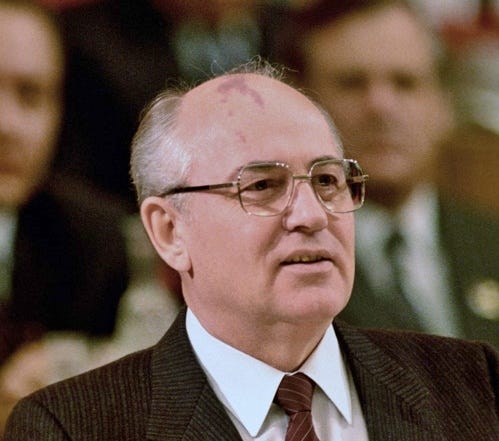
I didn’t plan to cover Iowa politics for a living. Twenty-five years ago, I thought writing about Russian political happenings would be my life’s work.
Mikhail Gorbachev came to power while I was in high school, and the perestroika period was the absolute peak for American college students learning the Russian language. I wasn’t initially fascinated by Soviet politics; I majored in Russian history and literature. By the time the USSR collapsed, I was enrolled in a Russian studies graduate program.
A few years after that, I landed my first writing job covering Russian domestic politics. But Gorbachev was rarely relevant to the stories I wrote during the second half of Boris Yeltsin’s presidency and the early Vladimir Putin era. I had forgotten several major events from his tenure before reading some of this week’s obituaries. (Marilyn Berger wrote a good one for the New York Times.)
Some other takes you may enjoy:
Radio Free Europe/Radio Liberty (where I worked during the 1990s) published noteworthy pictures of Gorbachev, starting with a childhood photo alongside his grandparents.
RFE/RL also compiled reaction from the post-Soviet world:
In the West, Mikhail Gorbachev is widely regarded as the Soviet leader who helped bring a peaceful end to the Cold War. In the post-Soviet states, however, many view him in a different light. Some within the region hold him responsible for brutal crackdowns during their fight for freedom and independence.
On the same wavelength, RFE/RL senior correspondent Tony Wesolowsky wrote about “Bloody Crackdowns And 'Criminal' Inaction: Mikhail Gorbachev's Darker Legacy.”
Mikhail Sokolov and Robert Coalson wrote about the deep divides among Russians about Gorbachev.
My husband Kieran Williams compared the Soviet reformer to Alexander Dubček of Czechoslovakia and Mohammad Khatami of Iran’s Islamic Republic in this essay on Medium: “Gorbachev’s fate was that of a certain political type, the liberalizer.”
(Throughout the 1990s, Kieran and I had a running argument about Russian politics. I was more sympathetic to Gorbachev, while he was more sympathetic to Yeltsin. We stopped debating this soon after Putin came to power, because both the last Soviet leader and the first Russian president were implicated in that tragedy.)
Kieran observed, “The greatest danger of all comes from people the liberalizer has surrounded himself with, thinking that even a team of rivals can be made to work as long as they all owe their jobs to him.”
Along those lines, emeritus Professor Archie Brown, author of The Gorbachev Factor and Seven Years that Changed the World, wrote in The Guardian,
During less than seven years in the Kremlin, Gorbachev achieved the kinds of reforms that no previous Soviet leader – or any other potential successor from Chernenko’s politburo – would have contemplated. The changes were also beyond the wildest dreams of western leaders in 1985 (as Margaret Thatcher acknowledged) and of Soviet reformers at that time, as I know from my conversations with them.
That did not prevent some of those same reformers castigating Gorbachev by 1990 for his supposed “half- measures” and transferring their allegiance to Boris Yeltsin.
Brown (one of my thesis advisers when I was writing about the Russian media) was among the first Sovietologists to pay close attention to Gorbachev as a possible future leader of the USSR. He explained in this interview how his acquaintance with one of Gorbachev’s university friends affected his thinking during the late 1970s.
Note to new subscribers: This Substack does not duplicate most Bleeding Heartland coverage. For a free email newsletter with links to all recent articles and commentaries from the website, subscribe to Evening Heartland here.




Thanks Laura
Thank you, Laura!